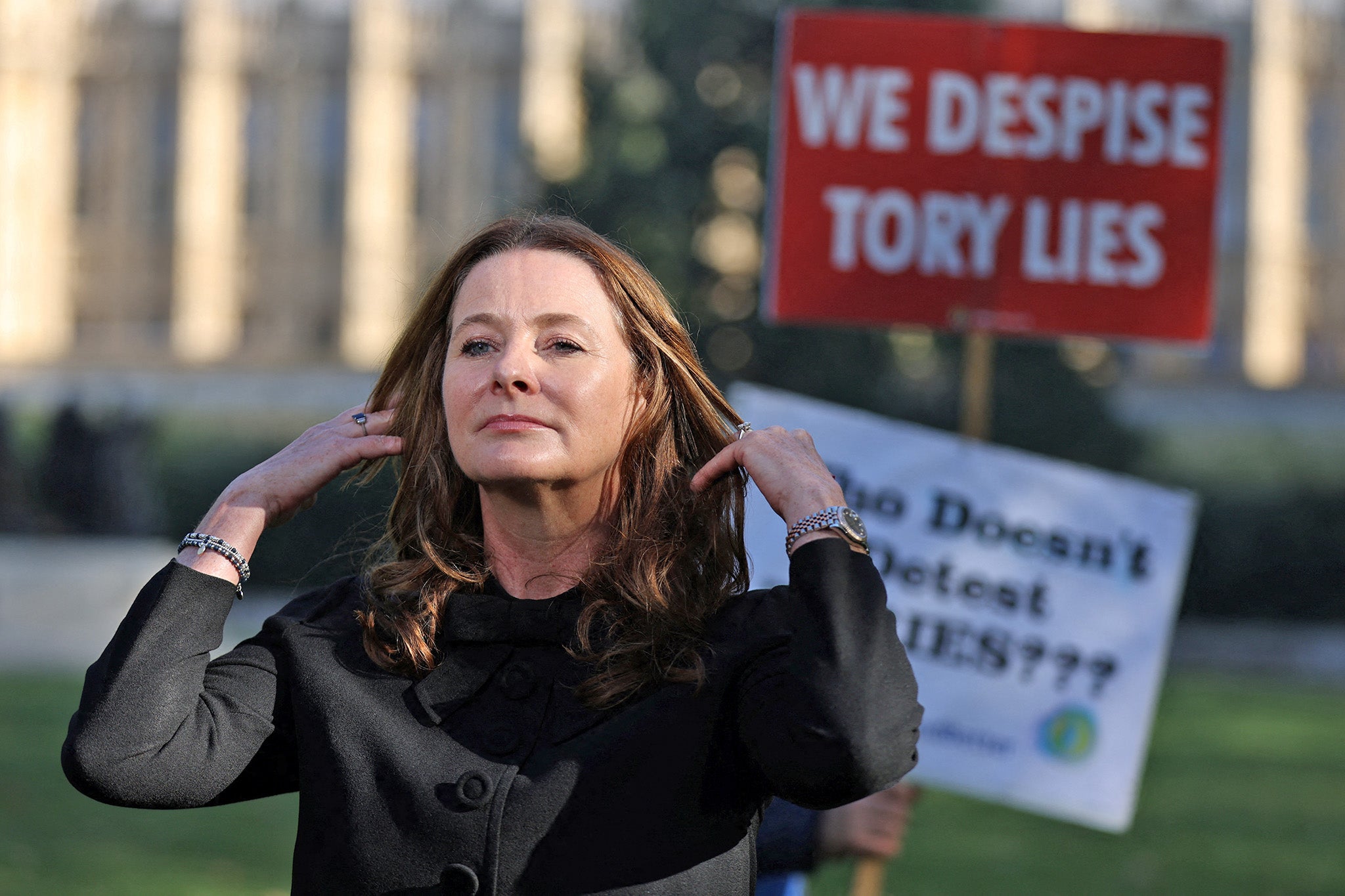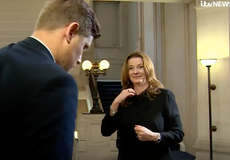If anyone sat around on their a*** doing nothing, it was Gillian Keegan
The hot mic meltdown revealed the Education secretary’s own stunning dereliction of duty – and an offensive sense of entitlement by a pound-store Marie Antoinette, writes Sean O’Grady


Your support helps us to tell the story
From reproductive rights to climate change to Big Tech, The Independent is on the ground when the story is developing. Whether it's investigating the financials of Elon Musk's pro-Trump PAC or producing our latest documentary, 'The A Word', which shines a light on the American women fighting for reproductive rights, we know how important it is to parse out the facts from the messaging.
At such a critical moment in US history, we need reporters on the ground. Your donation allows us to keep sending journalists to speak to both sides of the story.
The Independent is trusted by Americans across the entire political spectrum. And unlike many other quality news outlets, we choose not to lock Americans out of our reporting and analysis with paywalls. We believe quality journalism should be available to everyone, paid for by those who can afford it.
Your support makes all the difference.As an emblem of a government so out of touch that it looks for gratitude for presiding over 13 years of underinvestment that has left us with crumbling schools, we can do no better than Gillian Keegan’s “hot mic” moment, when she asked an ITV News correspondent:
“Does anyone ever say, ‘You know you’ve done a f****** good job because everyone else has sat on their arses and done nothing’. No signs of that, no?”
She has been slapped down by No 10 and made to apologise for her “choice language”, but it wasn’t how she said it but what she said that was so revealing – the apparent offensive sense of entitlement it suddenly illuminated, and in such stark contrast to the ritualistic expressions of concern for pupils and teachers.
She somehow managed to combine the preening entitlement of Marie Antoinette with the arrogance of former jewellery boss Gerald Ratner. She seemed to expect gratitude for failing to clean up a mess that she and her colleagues created. It is hard to believe a practising politician could be so delusional.
Were it not for the enormity of the wider scandal it would be more of a story. Were it not for the fact that Sunak has already had to make one small cabinet reshuffle only last week, Keegan might be out of a job. Yet the f-bomb she dropped has inflicted considerable damage for her and the administration.
Elsewhere Keegan has pleaded that she couldn’t sleep because she was so worried about the scandal that was engulfing her and the government. She may also have been considering what the series of colossal blunders that led us to this situation will do to her.
She may only have been in the post a relatively short period of time, but she has to take her share of collective responsibility for what has happened over the years; and full responsibility for what she did and did not do since she was appointed education secretary in October last year.
By that time the problem with RAAC concrete in schools (and other buildings) was perfectly apparent. Let us be specific about what Keegan herself got wrong, and why she and her colleagues – especially in the Treasury – deserve scorn rather than thanks.
What should have happened many months ago was an accelerated programme to swiftly identify the problem schools and get the remedial works done with zero delays. Instead, Keegan’s department was still using a system of voluntary questionnaires asking heads if their schools had RAAC and/or asbestos in the classrooms – as if they knew or could easily find out by tearing down the ceilings and plasterwork.
Keegan and the Department for Education (DfE) just sat around – on their arses in fact – expecting the responses to drift in when the heads had the time. No sense of urgency about pillars collapsing or roofs falling in. No suggestion of that, no.
That, as should have been seen at the time, was far too leisurely a process, when the DfE could have commissioned qualified surveyors to go in, investigate and report on the problems and make recommendations in a specific way, with a risk assessment attached. The schedules of works could then have been prioritised efficiently, and construction undertaken in the vacations. The Treasury should have been funding such an ambitious programme without quibble.
Keegan and her minister of state, Nick Gibb, should at least have tried to get the money for such an emergency plan. From what we have have seen, they did not. It looks as though they sat around and then only woke up – panicked is a better expression – when “new evidence” emerged, which wasn’t that new anyway, and created chaos. And they expect us to thank them.
Jeremy Hunt says – now – that the government will spend what it takes to ensure safety – but it’s rather late. His predecessor as chancellor, Rishi Sunak can slice and dice the numbers any way he likes, but the fact remains that not enough resources were put into renovations when they might have made a difference. The former permanent secretary at the department, Jonathan Slater, has said that Sunak cut the programmes back from what was needed (as Gibb has admitted).
Now, head of the National Audit Office, Gareth Davies, has taken the extraordinary step of accusing Sunak’s government of a “sticking plaster approach” to buildings repairs in scathing remarks about the crumbling schools crisis.
Sunak has, according to Davies, neglected the “unflashy” job of maintaining public buildings in usable condition.
The results of that failure of vision and dereliction of duty are all too evident today – and we’ve been fortunate that no child has been injured as a result. Sunak is badly implicated in this scandal. In more normal times he’d have to go. As things are he’ll be limping even more badly as he tries to lead his party into the next election.
Ominously for the prime minister, his rating among party members in the latest Conservative Home panel survey has gone negative. The party conference may not be the harmonious launch pad for the campaign he must be hoping for.
The contrast with Starmer’s Labour is growing increasingly stark. The reshuffle of the shadow cabinet marks another significant step towards restoring the party’s credibility and showing it is ready to serve. The long march back of the Blairites is almost complete, and that is really all the country has been asking of the party since it started straying into the wilderness in 2010.
With one-time Blair aide Pat McFadden at the centre of campaign planning, the formidable Sue Gray making preparations for a smooth transition to power, and impressive performers such as Hilary Benn and Dan Jones on the front bench, Labour is doing more than allowing the Tories to destroy themselves.
Labour, for the first time in two decades, seems serious about listening to the voters and reassuring them where it can – but with no sense that the next few years will be anything other than difficult. The British people well understand the economic predicament the country is in, and they merely want a competent, serious, fair-minded government to try and steer them through it. In due course they may even reconsider whether Brexit lived up to its promise – but that is for another day.
Starmer is unshowy and lacks the charisma of the younger Blair, but that may be no bad thing for him or the nation he seeks to lead. He fits the mood of our more sober times exceedingly well. Sunak and Hunt, for all the good they have done since the chaos of the Johnson-Truss years, have the misfortune of heading a party and a government that has been in for too long and has lost the confidence of the voters.
The school buildings scandal only serves to remind the public that the Tories have forgotten how to govern. No wonder so many judge that it’s time for a change.




Join our commenting forum
Join thought-provoking conversations, follow other Independent readers and see their replies
Comments